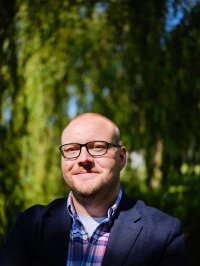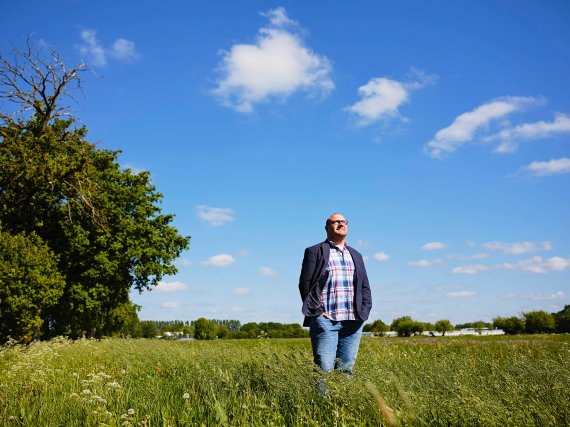You started out in food technology.‘To be honest, I hadn’t exactly thought that decision through. As a kid, I was a fan of Carl Sagan, the astronomer who presented the Kosmos series. So I once spent a day in the Astronomy department in Utrecht. The degree programme appealed to me, but the people were not very sociable. I thought, I won’t last five years here. My father suggested I take a look in Wageningen. At the open day, there was a machine that produced an enormous rainbow-coloured cake. Cool! That’s actually a very bad reason for choosing a degree course, but I like food and I like technology. I ended up taking seven years to get to Master’s level. I can justify one year’s delay because I was on the student council. But apart from that, I must admit I was quite lazy in those days. I was a member of Ceres and sometimes I’d just rather drink beer than do any work.’
Then you got your PhD on paint.‘Yes, another switch. When I’ve done one thing for a few years, I think it’s time for something else. I researched how to improve latex paint so that it could serve as a substitute for turpentine paint. Because turpentine is toxic and causes things like psycho-organic syndrome, which attacks the brain. Solvents are also the second biggest source of greenhouse gases in the world. Almost everything around us is varnished: cars, lampposts, packaging. I want my research to make a contribution to society. The science has now reached the point where solvents will be superfluous in a few years. But it is up to the industry to actually apply the techniques we have.’
After your PhD you were a postdoc at Harvard. Didn’t you want to stay there?‘I was offered a contract extension but I wanted to come back to the Netherlands. My father was getting on in years and my sister had two children by that point. I knew by then that I was gay and probably wouldn’t have a family myself so I was keen to see my niece and nephew grow up. As well as that, I don’t like the United States as a country. It’s great for scientists but it’s a terribly hard country for anyone who, for whatever reason, doesn’t do well in society. That upsets me. I’m too much of a Dutchman who likes it if we look after each other properly. And I thought I was going to research heaven. But what really makes Harvard stand out is the fact that there are a lot of good research groups under one roof. That creates the impression that the quality is outstanding, but you don’t have to leave Wageningen to be among the world’s top research groups.’
I learned a lot at Harvard but I didn’t like the US as a country

Not a positive experience, then?‘I learned a tremendous amount there. Such as how to write a good article and how to sell research. In the Netherlands, I had absorbed a fairly puritanical take on science: You have to work rigorously and systematically and when you’re done, you write it up matter-of-factly. At Harvard I learned to jazz it up a bit, so your work becomes a bit more accessible and gets into better journals. For young scientists aiming at a career, it can help if you get this sales trick under your belt.’
Once you were back in Wageningen you got to professor level pretty fast.‘Tenure track certainly worked out well for me. But I do see people fall by the wayside. There is a strong bias towards certain qualities. Whereas there are also scientists who are fantastic analytically but may have no talent for selling their research. They don’t make it, and I think that is a real pity. It leads to a monoculture, whereas diversity is important. Not just in terms of gender, sexual orientation or ethnicity, but also in terms of personalities.’
Paint, geckos’ feet and plants. There’s certainly no lack of diversity in your research.‘Haha, yes, I have broad interests. That’s why I have such a schizophrenic research programme, too. Paint is still an important line of research. We do research with scientists from the Rijksmuseum on what solvents do to oil paint. Once every 50 years, the layer of varnish is removed in order to clean the painting. But then you want to be sure that you’ll only remove that layer, and not the eyeball of one of the soldiers in Rembrandt’s Night Watch. So far they test whether any paint comes off with a cotton bud, but you’re actually too late by then. My PhD student Jesse has made a little gadget with which we can measure precisely where the solvent goes. The second important line of research that we are developing now is about the effect of mechanical forces in plant cells (see inset, ed.).’
What do you like best?‘I find that really very difficult to say. Whether I am in the lab talking to Dolf Weijers about plants or trying to measure cracks in statues in the Rijksmuseum, it’s all so nice. I am a creative spouter of ideas, really. It is of course important that the details are worked out, but that is not so much my thing. The advantage is that as an outsider, I often have a fresh angle on topics. The down side is that I’m not really know for one particular thing. So I sometimes get reactions such as: why are you applying for a grant for plant research? Don’t you work on paint?’
Those grant applications seem to go pretty well for you. Veni, Vidi… Vici?‘Of course that would be super, but even I don’t have a 100 per cent success rate. My financing strategy is a bit of a scattergun approach. And that does go wrong sometimes, and no one hears about those cases. I found those rejections difficult at first. You spend three months writing a proposal and you get nothing. To do this job you need to be able to cope with disappointment. It also makes me keep on pushing myself, and the one time it does work out, it feels great. Writing research proposals also gives me a chance to put my thoughts in order and to dream about my goals.’
What do you dream of then?‘Last year we invested a lot as a group in developing new measuring methods. I would like to make use of those now to answer questions. We are already working on it, in plant research for instance. I want to create space for curiosity-driven, fundamental research. Answering questions is not the same thing as solving problems, which is what you are often doing in contract research. The reality is of course that you need funding for it. I am fairly opportunistic about that and I look out for opportunities for it. I don’t have a whole strategy worked out for the next five years.’
You’ve made quite a splash as a teacher too. You have twice won a WUR Excellent Education Award. What is your secret?‘Children ask “why?” a hundred times a day. Then our education system does its best to knock that out of them. It makes you a nuisance. I try and stimulate my students to approach science with childlike enthusiasm and spontaneity. Science is cool and you can discover new things all the time. I think it’s fantastic when a PhD student storms into my office because he’s discovered something amazing. Then we try and figure out together what on earth is going on. I can’t stand monotony; there’s got to be some excitement.’
I stimulate my students to approach science with childlike enthusiasm
So are you a daredevil?‘Haha, no, far from it. Outside my work I’m quite boring really. I love going to a museum with my partner or going for a walk on the beach or in the woods. That has a calming effect on me. There’s actually always a circus going on in my head, day and night. I calm down in the woods. But I do all sorts of different things in my spare time too. Painting, woodwork, playing the trumpet – I’ve done all of those. When my partner and I met a year and a half ago I was convinced that ceramics was my passion. I even bought an oven for it. Now we are going to live together and I’ve just bought an artist’s easel. I can see him laughing already. He knows it will be on an online marketplace in six months. I’m thinking of asking for a chainsaw for my birthday because I fancy having a go at making ice sculptures.’
I’m thinking of asking for a chainsaw for my birthday because I fancy making ice sculptures
JORIS SPRAKEL (1980, OSS)
| 1998 – 2005 | Studied Food Technology at Wageningen |
| 2005 – 2009 | PhD (cum laude) supervised by Jasper van der Gucht (Physical Chemistry and Soft Matter) |
| 2009 – 2011 | Postdoctoral fellow at Harvard University (Boston, US) on a Rubicon grant |
| 2011 – 2019 | Associate Professor in the Physical Chemistry and Soft Matter chair group at WUR |
| 2011 en 2017 | Veni grant from the Netherlands Organization for Scientific Research (NWO) for research on geckos’ sticky feet |
| 2017 | Vidi grant from the NWO for research on nanomaterials inspired by nature |
| March 2019 | Appointed personal professor of Physical Chemistry and Soft Matter |
Sprakel is part of the Management Team of the 4TU (Reseach Centre High-Tech Materials) and the SoftComp Network of Excellence. He is about to start living with his partner, and is the proud uncle of a niece and nephew.
| MINI-FORCES IN PLANT CELLS |
|---|
| The latest branch of Joris Sprakel’s scientific tree is mechanobiology. He and his colleagues are studying how biological systems react to mechanical forces such as pressure. Hardly anything is known about this because the forces are so tiny that researchers could not measure their effects at cell level. Sprakel: ‘We are now developing sensors that can measure those small forces, using molecules that change colour under pressure, for example.’ The aim of the study is to understand why biological systems get stronger when exposed to mechanical force. ‘If you exercise muscles, they get stronger. But synthetic materials get weaker if you expose them to forces. I want to know how that works, and to do that I have to be able to measure what is happening first. Eventually we can use that knowledge to make sustainable synthetic materials, such as a car tyre that gets stronger the more you drive on it, or paint that never fades.’ |

 Photo: Roger Cremers
Photo: Roger Cremers